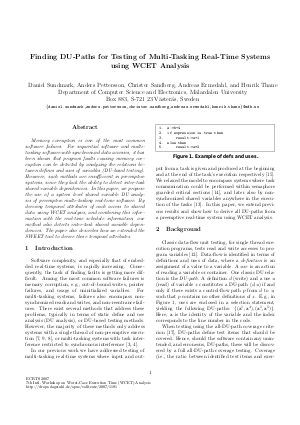Finding DU-Paths for Testing of Multi-Tasking Real-Time Systems using WCET Analysis
Authors Daniel Sundmark, Anders Petterson, Christer Sandberg, Andreas Ermedahl, Henrik Thane
-
Part of:
Volume:
7th International Workshop on Worst-Case Execution Time Analysis (WCET'07) (WCET 2007)
Part of: Series: Open Access Series in Informatics (OASIcs)
Part of: Conference: Workshop on Worst-Case Execution Time Analysis (WCET) - License:
 Creative Commons Attribution-NonCommercial-NoDerivs 3.0 Unported license
Creative Commons Attribution-NonCommercial-NoDerivs 3.0 Unported license
- Publication Date: 2007-11-13
File

PDF
OASIcs.WCET.2007.1191.pdf
- Filesize: 225 kB
- 6 pages
Document Identifiers
Subject Classification
Keywords
- Testing
- Real-time systems
- WCET analysis
- data flow
Metrics
- Access Statistics
-
Total Accesses (updated on a weekly basis)
0PDF Downloads0Metadata Views
Abstract
Memory corruption is one of the most common software failures. For sequential software and multi- tasking software with synchronized data accesses, it has been shown that program faults causing memory cor- ruption can be detected by analyzing the relations be- tween defines and uses of variables (DU-based testing). However, such methods are insufficient in preemptive systems, since they lack the ability to detect inter-task shared variable dependencies. In this paper, we propose the use of a system level shared variable DU analy- sis of preemptive multi-tasking real-time software. By deriving temporal attributes of each access to shared data using WCET analysis, and combining this infor- mation with the real-time schedule information, our method also detects inter-task shared variable depen- dencies. The paper also describes how we extended the SWEET tool to derive these temporal attributes.
Cite As Get BibTex
Daniel Sundmark, Anders Petterson, Christer Sandberg, Andreas Ermedahl, and Henrik Thane. Finding DU-Paths for Testing of Multi-Tasking Real-Time Systems using WCET Analysis. In 7th International Workshop on Worst-Case Execution Time Analysis (WCET'07). Open Access Series in Informatics (OASIcs), Volume 6, pp. 1-6, Schloss Dagstuhl – Leibniz-Zentrum für Informatik (2007)
https://doi.org/10.4230/OASIcs.WCET.2007.1191
BibTex
@InProceedings{sundmark_et_al:OASIcs.WCET.2007.1191,
author = {Sundmark, Daniel and Petterson, Anders and Sandberg, Christer and Ermedahl, Andreas and Thane, Henrik},
title = {{Finding DU-Paths for Testing of Multi-Tasking Real-Time Systems using WCET Analysis}},
booktitle = {7th International Workshop on Worst-Case Execution Time Analysis (WCET'07)},
pages = {1--6},
series = {Open Access Series in Informatics (OASIcs)},
ISBN = {978-3-939897-05-7},
ISSN = {2190-6807},
year = {2007},
volume = {6},
editor = {Rochange, Christine},
publisher = {Schloss Dagstuhl -- Leibniz-Zentrum f{\"u}r Informatik},
address = {Dagstuhl, Germany},
URL = {https://drops.dagstuhl.de/entities/document/10.4230/OASIcs.WCET.2007.1191},
URN = {urn:nbn:de:0030-drops-11914},
doi = {10.4230/OASIcs.WCET.2007.1191},
annote = {Keywords: Testing, Real-time systems, WCET analysis, data flow}
}
